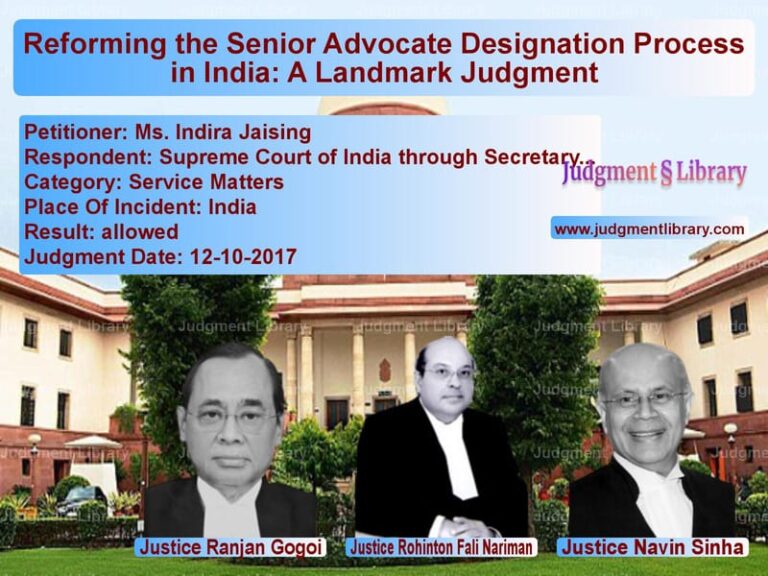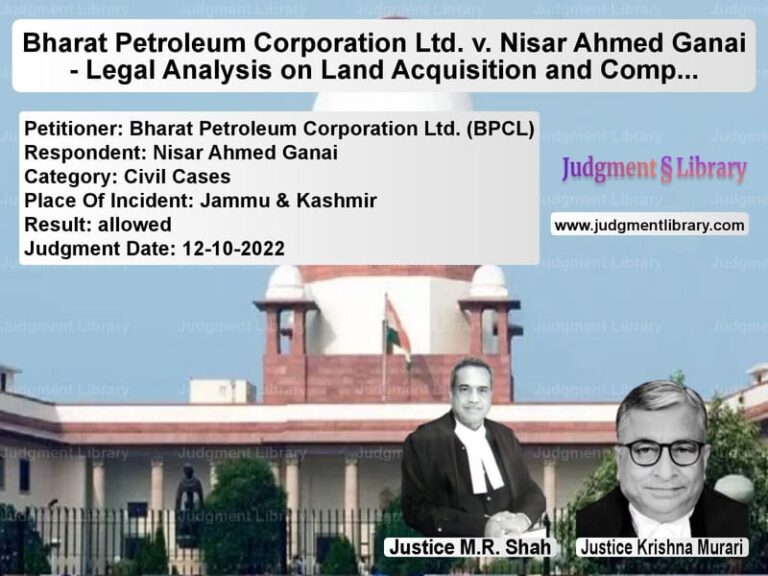Supreme Court Clarifies Burden of Proof in Property Disputes: A Landmark Partition Suit Judgment
The Supreme Court of India recently ruled on a significant partition suit in Ram @ Ramdas Sheshrao Neharkar v. Sheshrao Baburao Neharkar & Others. The case involved complex family disputes over ancestral property, with the appellant claiming a rightful share based on his alleged lineage. The judgment underscores the critical principle of burden of proof in civil cases and highlights the necessity of documentary evidence in property disputes.
Background of the Case
The case was initiated by the appellant, Ram @ Ramdas Sheshrao Neharkar, who filed a suit seeking partition and separate possession of a share in the ancestral property. The appellant claimed that his mother, Padminibai, was legally married to respondent no. 1, Sheshrao Baburao Neharkar, and that he was born from this wedlock. On this basis, he asserted his right to a 1/5th share in the family property.
The suit was first heard in the Trial Court, which ruled in favor of the appellant and granted him a share in the property. This ruling was subsequently upheld by the First Appellate Court. However, the High Court overturned both decisions, concluding that the appellant had failed to provide sufficient evidence to substantiate his claim. The matter was then brought before the Supreme Court.
Key Issues Before the Court
The Supreme Court was tasked with resolving the following key legal questions:
- Whether the appellant had provided adequate proof of his mother’s marriage to respondent no. 1.
- Whether the burden of proof had been correctly applied by the lower courts.
- Whether oral evidence alone was sufficient to establish a claim in a partition suit.
- Whether the High Court had exceeded its jurisdiction by re-examining the facts of the case.
Petitioner’s Arguments
The appellant made several arguments in support of his claim:
- He asserted that his mother, Padminibai, was legally married to respondent no. 1 and that he was their legitimate son.
- He contended that the Trial Court and the First Appellate Court had rightly recognized this fact, and the High Court should not have re-evaluated the evidence.
- He maintained that his right to a share in the property was based on well-established legal principles of inheritance.
- He argued that the High Court erred in dismissing the suit by placing undue emphasis on documentary evidence, when oral testimony should have been considered sufficient.
Respondent’s Arguments
The respondents, led by Sheshrao Baburao Neharkar, countered these claims with the following arguments:
- They denied the existence of any marital relationship between respondent no. 1 and the appellant’s mother.
- They emphasized that no marriage certificate or other documentary proof had been submitted to substantiate the claim.
- They pointed out that the appellant had delayed filing the suit for 16-17 years after attaining majority, raising doubts about the legitimacy of his claim.
- They argued that the High Court had rightly intervened, as the lower courts had erred in accepting oral testimony without corroborating documentary evidence.
Supreme Court’s Observations
The Supreme Court conducted a detailed examination of the evidence and made several key observations:
1. The Importance of Documentary Evidence
The court reiterated that in property disputes, especially partition suits, documentary evidence is of paramount importance. The absence of a marriage certificate or other supporting documents weakened the appellant’s case.
2. Burden of Proof in Civil Cases
The judgment emphasized that the burden of proof lies with the claimant in partition suits. The appellant failed to provide conclusive evidence to establish his claim, making the High Court’s intervention justified.
3. Oral Testimony vs. Documentary Proof
While oral testimony can be considered, the court stressed that it must be backed by documentary proof. In this case, the appellant’s reliance on oral testimony was insufficient to override the need for tangible evidence.
4. High Court’s Jurisdiction in Re-Evaluating Evidence
The court clarified that High Courts have the authority to re-examine evidence if the lower courts have made errors in their judgment. The reversal of the lower court decisions was deemed appropriate in this case.
Final Judgment
After careful consideration, the Supreme Court ruled:
- The High Court’s decision to dismiss the appellant’s claim was upheld.
- The appellant had failed to meet the burden of proof required in partition suits.
- The reliance on oral testimony, without documentary support, was insufficient to establish the claim.
- The appeal was dismissed with no order as to costs.
Implications of the Judgment
This ruling sets a significant precedent in property law. It reinforces the principle that claimants in partition suits must provide strong documentary evidence to substantiate their claims. Oral assertions, no matter how persuasive, cannot replace documentary proof.
By upholding the High Court’s decision, the Supreme Court has ensured that property disputes are resolved based on substantive evidence, preventing frivolous claims from disrupting family property arrangements.
The case highlights the need for legal diligence in inheritance matters. Future litigants must ensure that they possess adequate documentary proof before approaching the courts with claims over ancestral property.
Petitioner Name: Ram @ Ramdas Sheshrao Neharkar.Respondent Name: Sheshrao Baburao Neharkar & Others.Judgment By: Justice C.T. Ravikumar, Justice Rajesh Bindal.Place Of Incident: Maharashtra.Judgment Date: 09-07-2024.
Don’t miss out on the full details! Download the complete judgment in PDF format below and gain valuable insights instantly!
Download Judgment: ram-@-ramdas-sheshra-vs-sheshrao-baburao-neh-supreme-court-of-india-judgment-dated-09-07-2024.pdf
Directly Download Judgment: Directly download this Judgment
See all petitions in Property Disputes
See all petitions in Succession and Wills
See all petitions in Landlord-Tenant Disputes
See all petitions in Specific Performance
See all petitions in Damages and Compensation
See all petitions in Judgment by C.T. Ravikumar
See all petitions in Judgment by Rajesh Bindal
See all petitions in dismissed
See all petitions in supreme court of India judgments July 2024
See all petitions in 2024 judgments
See all posts in Civil Cases Category
See all allowed petitions in Civil Cases Category
See all Dismissed petitions in Civil Cases Category
See all partially allowed petitions in Civil Cases Category







